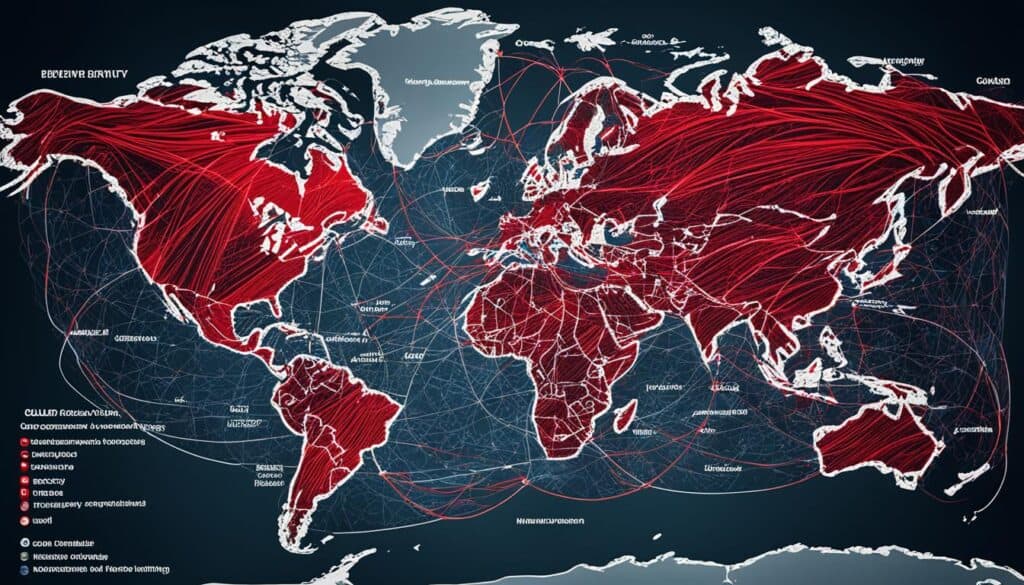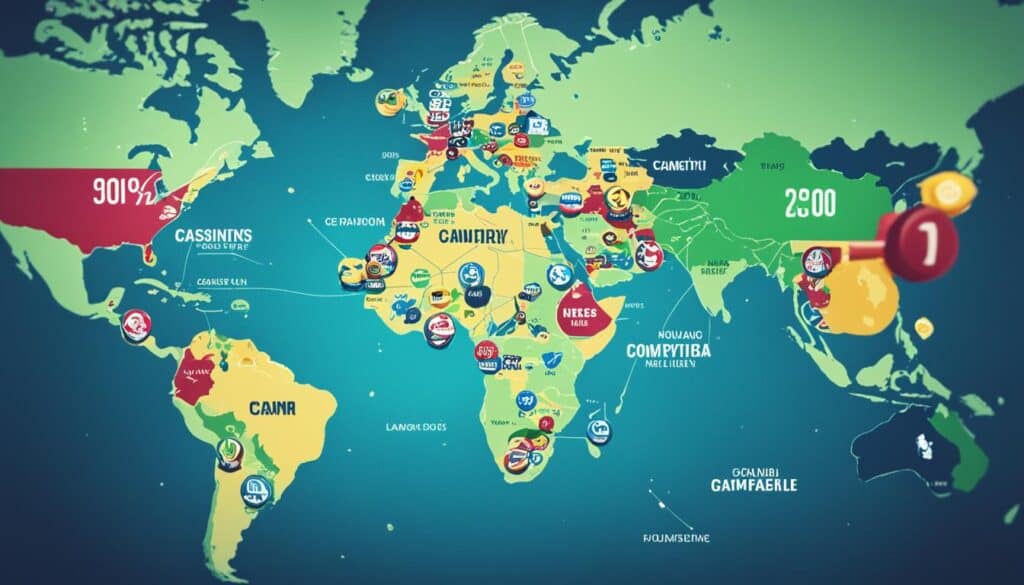The advent of technology and an unforeseen global shift towards remote entertainment have catalyzed a profound transformation within the realm of online gambling. Countries and jurisdictions worldwide are increasingly recognizing and fostering the digital expansion of betting and gaming platforms. Critical to this progression are the global online gambling laws that are being crafted to shepherd this burgeoning economic sector, encompassing aspects of legalization, taxation, and comprehensive international betting regulations. The scope of understanding global online gambling regulations is not merely legalistic but also impacts socio-economic development and ethical gaming practices.
As online gaming gains mainstream footing, the need for a cohesive understanding of these regulations becomes even more pertinent. Legislators in the United States are already charting growth trajectories in sports betting and iGaming, tracking alongside global trends. Regions are grappling with novel challenges, such as Florida’s legal entanglements or Kentucky’s legislative ingenuity in integrating sports betting with its horse racing heritage. Nonetheless, the drive towards safeguarding player interests highlights a collective shift towards responsible, regulated, and ethically inclined gaming experiences worldwide.
The Evolution of Global Online Gambling Laws in the Digital Era

The advent of the internet drastically transformed various industries, and the gambling sector is no exception. In recent years, there has been a notable trend towards reassessing online gambling regulations to acknowledge its growing presence in the international sphere. As the digital era forges ahead, countries worldwide face the necessity of adapting to the burgeoning international betting markets and the complexities of gambling law differences.
The digital revolution has ushered in new gaming formats, such as eSports, which have skyrocketed in popularity and have forced a reconceptualization of what constitutes gambling
and betting. These novel trends necessitate jurisdictions to navigate the blurred lines between different forms of digital entertainment and gambling, requiring a fresh look at existing laws and the enactment of modern regulations that reflect the present state of online gambling.
- Expanded accessibility to online gambling platforms has catalyzed legislative approaches favoring legalization and regulation.
- The adoption of rigorous licensing procedures aims to ensure consumer safety and operator accountability.
- Differing approaches to taxation and revenue generation illustrate the diverse goals and challenges faced by governing bodies.
- Technology-driven developments in the industry prompt continuous reevaluation of regulation and compliance measures.
- International collaboration and standardization of gambling laws remain a debated topic among jurisdictions with conflicting interests and policies.
Not only are these changes necessary from a legal standpoint, but they also offer significant economic advantages. Aligning laws with technological advancements enables countries to tap into a lucrative market while maintaining a secure and ethical gambling environment.
A keen understanding of the dynamic landscape of the digital gambling world is conducive to informed and effective policymaking. As the digital era progresses, stakeholders and legislators alike must remain vigilant, ensuring that the legal frameworks established around the world serve to foster a responsible, fair, and economically productive online gambling industry.
Expanding Horizons: The Growth of U.S. Online Gambling Markets

The U.S. online gambling markets have experienced unprecedented growth, with state gambling regulations differing across the country as they attempt to tap into this lucrative sector. Sports betting legalization has been at the forefront of this expansion, showing how the legislative landscape adapts to new forms of gaming and consumer behavior.
The Sports Betting Boom and State Regulation Variance
Every state’s approach to sports betting and online gambling varies, and these inconsistencies highlight the fragmentation of US online gambling markets. States navigate through a maze of legislative requirements, seeking to balance public interest and economic benefit. Some states have fully embraced the sports betting boom, setting forth comprehensive regulatory frameworks, whereas others trail behind, cautiously evaluating the implications of market entry.
- States with full legalization and operation of sports betting platforms
- States in the legislative process of legalizing sports betting
- States with no action or movement towards sports betting legalization
The map of legalization is in constant flux, with legislative efforts accelerating in several jurisdictions, aiming to capture a share of this fast-growing market.
Case Studies: Florida’s Legal Complications and Kentucky’s Proactive Approach
In Florida, the partnership between the government and the Seminole Tribe has led to complicated legal challenges, throwing a spotlight on the complexities inherent in state and tribal negotiations. The situation underscores the nuanced hurdles that can arise with sports betting legalization efforts in the US. On the contrary, Kentucky has displayed a proactive stance with the introduction of House Bill 551, showcasing how sports betting can be integrated into the existing horse racing industry, reflecting a strategic and regulated model intended to generate substantial revenue through formalized taxes and fees.
- Analysis of Florida’s legal quandaries and ongoing litigation with the Seminole Tribe
- Overview of Kentucky’s initiative to merge sports betting with its traditional horse racing market
- Insights into the regulatory strategies adopted by Kentucky lawmakers to ensure market growth and protect consumer interests
These case studies signify the range of approaches taken by state legislatures across the nation, impacting the trajectory of sports betting and online gambling in the US.
International Betting Regulations and Their Economic Significance

The global landscape of gambling continues to evolve, with nations recognizing the potential for economic growth through regulated international casino markets. As governments worldwide adjust their online gambling regulations, the economic impact of these changes becomes a focal point for discussion and planning. Not only do such regulations play a central role in generating revenue through taxation, but they also ensure the orderly operation of a sector that is rapidly expanding.
- The restructuring of gambling regulation has led to significant global online betting taxation, presenting new revenue streams for national and local governments.
- These alterations in legal frameworks are actively shaping international casino markets, contributing to the burgeoning economics of the gambling industry.
- However, with the high stakes of gambling revenues comes the parallel challenge of illegal betting operations, which siphon off potential tax earnings and support shadow economies.
- Acknowledging the economic impact of gambling regulation, many countries are increasingly incentivized to develop systematic approaches to regulate and harness the financial benefits of this sector.
The critical role of legislation in economic terms is evident not only in the prosperity it can bring to a country but also in the risks it mitigates against underground and unethical practices. Properly implemented gambling regulations provide a framework for transparency and accountability, which is indispensable for attracting legitimate investments and consumer trust in international casino markets.
Protecting the Players: Global Initiatives on Secure Online Gambling

In the ever-evolving arena of online betting, a paradigm shift towards player protection in online gambling is evident. Operators, regulators, and industry stakeholders are increasingly focusing on secure online betting practices, endorsing responsible gaming initiatives to provide a safe gambling space for consumers worldwide.
The Rise of Identity Verification in Online Gambling
Integral to safeguarding the online gambling ecosystem, enhanced identity verification measures are being employed to prevent fraudulent activities and impede underage gambling. These measures echo a united industry movement aimed at reinforcing secure and responsible gambling principles.
- Implementation of advanced KYC (Know Your Customer) procedures
- Adoption of AI-driven technologies to detect suspicious account behaviors
- Enforcement of age-verification checks prior to commencement of gameplay
- Integration of real-time data analysis tools for monitoring and verification purposes
Global Commitment to Ethical and Responsible Gaming
The commitment to player protection in the landscape of online gambling stretches across borders, uniting regions under the common goal of ethical gaming. These wide-reaching responsible gaming initiatives symbolize the industry’s dedication to nurturing a trustworthy environment for gamblers, which, in turn, supports the sustainable growth of the gambling sector.
- Promotion of responsible gambling resources and helplines
- Setting up self-exclusion programs for players seeking to manage their gambling habits
- Formulating collaboration platforms among operators for sharing best practices
- Establishing transparency standards for game rules and odds
As the online gambling scene continues to mature, these ensured practices reflect a steadfast pursuit of an ethical and player-centric gaming milieu. Recognizing that the future of online betting rests on the well-being of the consumer, the global gambling community is actively shaping a more secure and responsible future for all stakeholders involved.
Global Online Gambling Laws: Legislation Updates and Stalemates

As the landscape of global sports betting markets continues to evolve, the push for updates in gambling legislation has become a crucial battleground for states across the globe. While some regions witness significant advancements, others are met with legislative stalemates, indicative of the complex and nuanced nature of this dynamic industry. This section explores the latest developments and impediments in the quest to modernize online gambling laws and the ongoing lobbying for more accommodating online betting regulations.
Emerging Legal Landscapes: Successes and Setbacks
The global stage presents a mixed bag of legislative changes with countries both hitting their stride and encountering severe roadblocks. Take, for example, Canada’s recent foray into legalizing single-event sports betting, offering a more liberal and competitive market. Contrastingly, countries like South Africa continue to uphold stringent controls, minimizing the expansion of online betting. This dichotomy illustrates the global pulse of gambling legislation updates, where triumphs and defeats are common narratives.
State-Specific Challenges and the Lobby for Legalization
Varied state reactions within the same nation also underscore the complex nature of aligning state-specific interests with broadscale legislative changes. The United States serves as a prime example, where states such as New Jersey and Pennsylvania have embraced online betting, setting the benchmark for economic success and player protection. However, others like Georgia require constitutional amendments for legalization, creating an uphill battle for proponents of online betting laws. The lobbying efforts in these states are often intensive, seeking to align the economic and moral arguments for a regulated online betting environment.
- In Georgia, a voter referendum is now considered the litmus test for potential legal acceptance of sports betting, eyeing changes by 2024.
- Minnesota’s attempts at legalizing sports betting are teaching lawmakers about the fine art of navigating the diverse interests of tribal entities and commercial stakeholders.
As modifications in gambling legislation continue to unfold, the coming years are poised to be pivotal for the global gambling industry. The juxtaposition of the lobbying efforts, legislation updates, and the resultant economic impact underscores the interconnectedness of regulatory actions and their broader market implications. It is clear that the international call for progressive online betting laws will not just shape the legal frameworks but also the health and growth of global sports betting markets for the foreseeable future.
Illegal Online Gambling and Its International Impact

The shadow of illegal online gambling looms large over the international community, not only presenting a significant legal challenge but also invoking social and economic repercussions. As governments and regulatory bodies navigate this treacherous terrain, the prevalence of these unauthorized activities continues to surge, leaving behind a trail of untold damage in its wake.
The Economic Drain of Unregulated Gambling
The financial implications of unregulated betting markets are profound. The absence of regulation means that economies lose out on collecting billions in tax revenue that could otherwise be utilized for public services or infrastructure development. The allure of the potential profits from illegal online gambling often encourages operators to flout the law, impacting the integrity of both local and global finance.
- Deviation of legitimate funds into illegal channels
- Potential harm to consumers due to lack of legal recourse
- Influence on the economic stability of regulated gambling entities
Societal and Criminal Costs of Illegal Betting Markets
The consequences of illegal gambling rings extend beyond mere numbers. There is a profound societal cost, ranging from the exploitation of vulnerable individuals to the proliferation of criminal enterprises. Issues such as problem gambling escalate with the absence of safeguards typically enforced in regulated environments. Moreover, the nexus between illegal gambling and criminal activities composes a complex web that threatens the social fabric of communities.
- Incidence of problem gambling and related financial distress among individuals
- Connection with money laundering operations and corruption
- Bad actor influence leading to compromised law enforcement efforts
Deciphering the Legality of Cross-Border Betting

As online gambling continues to draw a global audience, nations are faced with the complexities of cross-border betting legality. Navigating through this intricate network of international gambling regulations requires an intensive grasp over the diverse jurisdictional laws that govern the realm of worldwide gaming. It’s essential for industry leaders and global authorities to understand these nuances to effectively combat illegal betting activities that operate beyond borders.
Regulatory Challenges and Jurisdictional Conflicts
The proliferation of online betting platforms has given rise to several regulatory challenges. Nations often find their gambling laws at odds with those of other countries, resulting in jurisdictional conflicts that complicate the landscape of international gambling. For players, understanding where and how they can legally place bets becomes an equally daunting task. Clarifying cross-border betting legality is essential for a harmonized gambling environment that respects the laws of all jurisdictions involved.
International Collaboration Against the Black Market
The fight against illegal betting is not one that can be tackled by single nations in isolation; it requires international collaboration. Law enforcement agencies and regulatory bodies are merging efforts and intelligence to dismantle the black market of unregulated gambling that not only evades taxation but often funds other illicit activities. Technologies like Netsweeper are at the forefront of this effort, providing advanced solutions to detect and impede access to unauthorized gambling sites through sophisticated machine learning algorithms.
- Investigating regulatory discrepancies that facilitate illegal betting
- Strengthening international legal frameworks to police cross-border betting
- Leveraging technology to identify and block access to illegal gambling operations
- Enhancing communication channels between different jurisdictional authorities
Ultimately, the legal ambiguity surrounding cross-border betting necessitates not just legal acumen but also technological prowess and international cooperation. As the digital age ushers in a borderless world of gambling, aligning international gambling regulations will play a critical role in both maximizing legal betting opportunities and combating the illegal betting syndicates that threaten the integrity of the sport and economies worldwide.
Key Differences in Asian vs European Gambling Laws

The intricacies of global gambling practices are particularly evident when examining the contrasting legal landscapes of Asia and Europe. While both regions boast rich traditions of betting and gaming, the legal frameworks and cultural perceptions that underpin their gambling laws differ substantially, influencing the operations for stakeholders and participants alike.
Comparative Analysis of Regulatory Frameworks
In Europe, the gambling laws are often characterized by regulated liberalization with acts to ensure consumer protection, prevent crime, and maintain order in gambling activities. Countries like the United Kingdom and Malta have established themselves as leaders in regulated online gaming, attracting international operators with their sophisticated licensing regimes. Conversely, in many Asian countries, gambling laws can be more restrictive, with only certain forms of gambling permitted, and some nations, such as China, where gambling is largely illegal, barring lotteries and some forms of sports betting.
- European regulatory bodies like the UK Gambling Commission set industry standards for consumer protection and fair play.
- In Asia, places like Macau and the Philippines allow gambling but with stringent controls, illustrating a different regulatory perspective compared to Europe.
- Despite these differences, both regions face challenges in regulating online gambling due to its borderless nature and technological advancements.
Cultural Considerations in Online Gambling Legislation
The attitude towards gambling in both regions is deeply rooted in their respective cultures, influencing their regulations. For example, in some Asian cultures, certain forms of gambling are seen as a part of social and cultural events, whereas in Europe, gambling is often treated as a commercial activity with an emphasis on individual responsibility and harm reduction.
- In Asia, traditional forms of betting such as pachinko in Japan have cultural significance, yet remain under distinct legal treatment.
- Euro-centric models of online gambling regulations uphold ideals of open market competition balanced by social welfare concerns.
- Responsible gambling measures differ vastly; in Europe, they are often industry-led and standardized, while in Asia, such measures may vary greatly by nation and cultural norms.
Comparing US vs UK Online Gambling Regulations

The landscape of online gambling is markedly shaped by national frameworks that reflect unique regulatory philosophies and marketplace maturity. Specifically, a close examination of the US and UK gambling environments showcases stark contrasts in legislative approaches and market developments. This analysis is crucial for international stakeholders who must navigate these mature yet divergent markets.
Mature Markets and Divergent Approaches: A Comparative Study
The US market displays a complex patchwork of state-by-state regulations, with the recent legalization of sports betting unleashing a wave of legislation custom-tailored to individual state perspectives and needs. In contrast, the UK benefits from a more centralized gambling authority, the Gambling Commission, which oversees and regulates a mature gambling ecosystem. The divergence between the two is also emblematic of broader distinctions in regulatory philosophy and consumer protection mechanisms.
- US market characterized by dynamic change following the repeal of PASPA and individual states determining their own gambling destinies.
- UK market regulated by the comprehensive Gambling Act of 2005, fostering a stable and mature online gambling landscape.
In grasping these divergent approaches to gambling regulations, entities must consider several facets inherent to each territory, illuminated below:
- The scale of regulatory jurisdictions: Federal vs. State in the US; National in the UK.
- The scope and nature of licensing requirements for operators.
- The role of consumer protection and responsible gambling initiatives.
- The extent of market openness to international online gambling vendors.
- Enforcement strategies and the impact on market shaping.
As the sectors continue to evolve, the interplay between the US’s evolving landscape and the UK’s established benchmarks offers a fascinating insight into global online gambling trends and potential future alignments or divergences. Understanding these can arm stakeholders with the knowledge to adapt and thrive in the ever-progressing world of online gambling.
Understanding Global Online Gambling Regulations and Market Dynamics

The intricate fabric of the global online gambling market is constantly evolving, driven by changes in regulations and shifts in consumer behavior. Operators, regulatory bodies, and stakeholders must navigate this complex landscape with a forward-thinking approach to tap into burgeoning markets and align with international standards on regulated international betting. Not only does this involve keeping abreast with the current legislation, but also acclimatizing to the prevailing market dynamics across different jurisdictions.
The burgeoning global online gambling market dynamics make for a challenging yet rewarding scenario. Regulatory frameworks vary greatly from one region to another, necessitating a nimble and informed approach to governance and business expansion. For any entity looking to excel in the maze of global regulations, an up-to-date knowledge of the following envisaged trends and regulatory landscapes is crucial:
- Legislative developments and amendments in key markets
- Economic impacts of regulated international betting activities
- Consumer protection measures and responsible gambling enforcement
- Technological advancements and their implications on online gambling
- Strategic alliances and partnerships that shape market entries and expansions
Through continuous scrutiny and analysis of these aspects, stakeholders can identify the nuances of diverse markets, forming strategies that are both legally compliant and commercially viable. Understanding and adapting to the global online gambling dynamics is not just about legal expertise; it’s also about market sensitivities that dictate successful engagement with both seasoned and emerging sectors within the industry.
The Legal Challenges in Global Sports Betting Markets

As global sports betting markets expand, the complexity and the legal challenges they present grow correspondingly. At the forefront of these challenges is the urgent need to address the delicate balance between lucrative betting markets and the integrity of sports. With vast sums of money at stake, it’s imperative that the sports themselves remain uncontaminated by the potential influence of betting activities—ensuring that the unpredictable nature of sports, which is the very essence of their appeal, is preserved.
Tackling Integrity in Sports and Betting Correlations
Ensuring the integrity of sports while accommodating a booming betting industry is a multifaceted dilemma. Legal frameworks must encompass far-reaching measures that extend beyond national borders, as sports betting transcends geographic limitations through online platforms. To counter the coercion of athletes, manipulation of matches, and insider betting, initiatives like integrity units within sports organizations and betting monitoring systems are being increasingly adopted.
- Implementation of advanced tracking software to monitor betting patterns and flag irregularities.
- Education programs for athletes and officials on the risks and implications of match-fixing.
- Cooperative efforts between betting operators, sports leagues, and regulatory bodies to foster a cohesive and proactive response to threats to sports integrity.
Strategic Alliances for Sports Betting Regulation
Combatting the legal challenges in global sports betting is not a battle to be waged by regulators alone. Instead, a collaborative approach has proven essential. Strategic alliances between various stakeholders are fundamental to developing robust regulatory frameworks. These partnerships ensure sports betting remains a fair practice and contribute positively to the economy and the sports it is based upon.
- Engagement between regulatory authorities to establish consistent rules and penalties for illegal betting activities.
- Establishment of international standards for sports betting regulation to harmonize the practice across borders.
- Dialogue between regulatory bodies and the gaming industry to understand the nuances of sports betting and to leverage their expertise in crafting effective regulation.
The successful navigation of these legal challenges is not only crucial for preserving the integrity of sports but also for the assurance of fair and transparent sports betting markets. As the landscape of global sports betting continues to evolve, so too must the strategies and collaborations that underpin its regulation and oversight.
Consumer Protection: Ensuring Fairness in Online Gambling

In an industry where vast sums of money are wagered every day, the importance of consumer protection in online gambling cannot be overstated. With advancements in technology, operators can now offer a wide range of online games, but this also demands rigorous fairness measures and secure gambling transactions to protect the rights and interests of players.
Championing the Players’ Rights and Game Transparency
The cornerstone of trust in the digital gaming arena rests upon the assurance of fairness in online games. Regulators and gambling platforms must work in concert to uphold this trust by enforcing game transparency and protecting players’ rights. This includes software that is regularly audited for random number generation and clear terms and conditions that make sure players are aware of the rules and their rights before they play.
- Regular audits by independent bodies to ensure game integrity
- Transparent terms of service and user agreements
- Accessible and fair dispute resolution processes
The Enforcement of Secure Payment Methods
Secure gambling transactions are as critical as the games themselves in online betting. It’s pivotal that consumer financial data remains confidential and protected from cyber threats. Implementing encryption protocols such as Secure Socket Layer (SSL) and two-factor authentication ensures that all transactions are safe from interception or fraud. Moreover, operators must only offer payment options from reputable financial service providers.
- Utilization of SSL technology for data encryption
- Integration of two-factor authentication for added security
- Partnerships with trusted financial service providers
The intertwining of strong consumer protection measures and the operative mechanisms of online gambling underscore the industry’s commitment to fair play and security—a winning combination for the consumer’s peace of mind.
Technological Innovations Reshaping Online Gambling

The online gambling industry is continuously redefined by technological innovations that enhance player experience and reshape market dynamics. Notably, revolutionary progress in payment methods and immersive gameplay are at the forefront of this transformation.
The New Territory: Cryptocurrency and Online Betting
Cryptocurrency in betting has emerged as a groundbreaking development, offering unmatched benefits such as privacy, security, and speedy transactions. The decentralization of these digital currencies aligns perfectly with the ethos of internet gambling, where anonymized, fast, and secure transactions are a high priority for operators and players alike.
- Enhanced Security: Blockchain technology ensures tamper-proof records of all transactions.
- Privacy Concerns Addressed: Cryptocurrencies enable players to gamble without divulging sensitive financial information.
- Global Accessibility: With cryptocurrencies, geographical barriers are removed, allowing global participation.
- Speed of Transactions: Cryptocurrency transactions are quicker than traditional bank transfers, offering immediate deposits and withdrawals.
Augmented Reality: A Game-Changer for Online Casinos
Augmented reality casinos are setting a new benchmark for how games are played and experienced. By overlaying digital information onto the real world, AR technology allows for an enhanced, interactive gaming environment that bridges the gap between physical casinos and their online counterparts.
- Immersive Experience: Players can interact with a 3D casino environment from the comfort of their homes.
- Interaction with Other Players: Augmented reality provides social elements, such as live chats and gestures.
- Innovative Gaming: Traditional games are getting an AR makeover, offering a fresh take on classics like blackjack and roulette.
The Impact of Gambling Law Differences on International Casinos

To thrive in the diverse world of international casinos, operators must navigate the complex terrain of gambling law differences and their consequent impact on the business. These legal variations can affect everything from game offerings to marketing strategies, making cross-national gambling adaptation a critical undertaking for industry success.
Adaptation Strategies for Cross-national Gambling Enterprises
Salient adaptation strategies are essential for international casinos that aim to accommodate the distinct regulations of each jurisdiction. Operators often employ regional customization, which encompasses not only language and currency adjustments but also the tailoring of games to align with local preferences and legal requirements.
- Investing in local market research to inform effective adaptation strategies.
- Ensuring compliance with regional gambling regulations through legal expertise.
- Developing culturally resonate marketing campaigns to engage different demographics.
License Variations and the Implications for International Operators
License variations are a particular area of challenge for international operators, as each jurisdiction has distinct requirements that may dictate the viability of their business model. Awareness of the administrative and legal implications inherent to various licensing regimes ensures operators can position themselves advantageously within the global market.
- Understanding specific licensing regulations to assess market entry viability.
- Acquiring different licenses to operate multi-jurisdictional online platforms.
- Maintaining ongoing compliance to preserve reputation and operational integrity.
Vision for a Sustainable Future of Online Gambling
The trajectory of the online gambling industry is charting a course towards a sustainable model, where economic prosperity coexists with a high standard of ethical online gaming. The crucial factor in sustaining this balance will continue to be the evolution of international betting laws that not only harness the revenue-generating potential of this burgeoning sector but also ensure a protective framework for players. With the convergence of technology and new legislation, the future envisions an industry that infuses integrity at every level, from the fairness of each bet to the security of transactions.
As we look ahead, the sustainable online gambling industry is anticipated to thrive on the pillars of innovation and responsible practices. The fusion of advanced technologies and rigorous regulatory oversight promises to make the future of international betting not just profitable but also a paradigm of player welfare and ethical operations. It will be a future where the excitement of the game goes hand-in-hand with guarantees of safety and transparency, fostering trust and longevity in player relationships with both platforms and the pastime itself.
The industry’s stakeholders, including regulators, operators, and software developers, are integral to crafting the framework for this progressive sector. They are tasked with the significant responsibility of propelling the industry forward without compromising on the core values of ethical online gaming. To this end, continuous dialogue, adaptive policies, and innovative solutions will be key in overcoming challenges and unlocking the full potential of a global online gambling landscape that is both lucrative and conscientious.
 Online Gaming Circuit
Online Gaming Circuit




